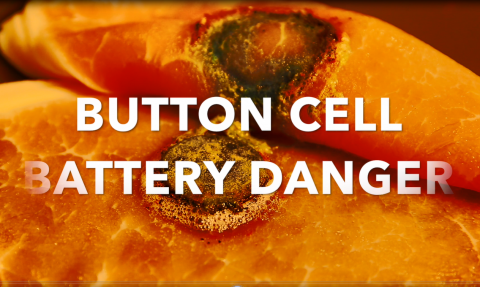Button battery and small toy warning ahead of Christmas

The Public Health Agency (PHA) is warning parents and guardians about the dangers of lithium button cell batteries, which are used to power many children’s toys but are highly dangerous if accidentally swallowed, and is also urging everyone to ensure any toys bought for Christmas are age-appropriate.
The festive period can typically see a rise in the number of small, button-shaped lithium cell batteries introduced to the home as they are contained in many toys, musical Christmas cards, remote controls and a host of other electronic items.
Hilary Johnston, Health and Social Wellbeing Improvement Manager at the PHA, said: “Young children are naturally inquisitive, and explore the world in part by putting things in their mouths.
“As new and interesting electronic items are introduced into the family home, the potential for children to swallow button cell batteries increases, and this can lead to choking, burning or poisoning.
“If undetected, button cell batteries can do serious damage to the gastrointestinal system. Lithium batteries react with saliva, setting up an electrical current which results in a build-up of caustic soda, which will burn through the oesophagus and major blood vessels.
“This can cause serious, life-changing injury, and if not caught in time, can be fatal.”
There are a few simple things that can be done to help protect young children from the dangers of button cell batteries:
- battery compartments should be checked to make sure they can’t be opened or broken easily;
- parents need to ensure that battery compartments are screwed shut when possible;
- keep spare batteries in a safe place out of reach of children;
- if you suspect your child has swallowed a button battery, seek medical help immediately.
Hilary added: “We want parents, grandparents, childminders and carers to be aware of the dangers associated with these batteries and to understand that these seemingly harmless objects can cause serious injury to children. Treat them the same way you would any poisonous substance – out of reach and out of sight.”
It is also important in general to follow manufacturer guidelines and use your own judgement to select toys that are appropriate for the age and ability of the intended recipient.
Hilary said: “It is important to remember that some children, particularly those under three, are more vulnerable to choking, and are less able to cope with some toys than older children. Therefore it is important to buy age-appropriate toys. We should also think about the ability and needs of the child – there can be significant differences in the abilities of children within the same age group, as children develop as different paces, and there are also children with special needs whose requirement should be considered – if you think there are risks associated with the toy, then it is best to avoid buying it.”
For more toy safety advice visit www.rospa.com/home-safety/advice/product/toy-safety
